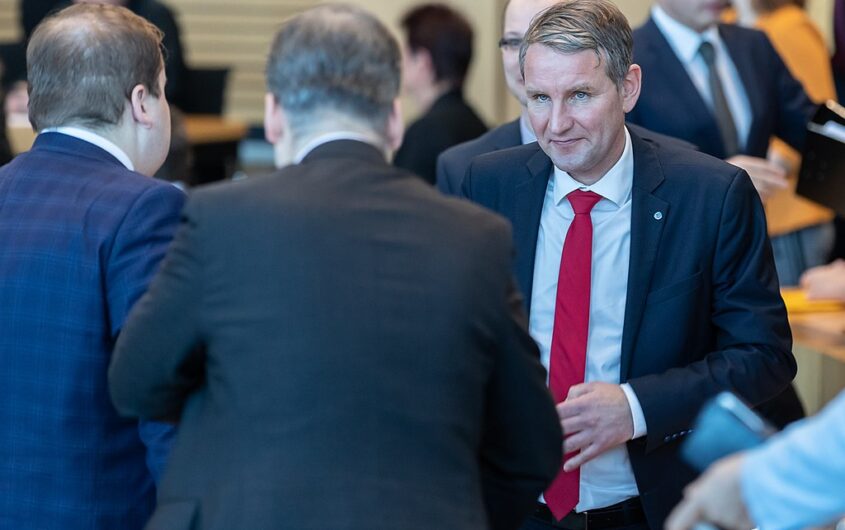
Steffen Prößdorf via Wikimedia Commons
AGI Profiles: Björn Höcke

Kiana Bussa
Halle Foundation/AGI Intern
Kiana Bussa is a research intern at AGI in summer 2024. Ms. Bussa is an undergraduate student at the University of Georgia where she majors in International Affairs and minors in International Human Rights and Security and Data Analytics for Public Policy. At UGA, Ms. Bussa has conducted independent research with the GLOBIS Human Rights Research Lab and developed policy-related skills in the Security Leadership Program with the Center for International Trade and Security. In her spare time, she debates with the Phi Kappa Literary Society.
Member of the Thuringian State Parliament and Chair of AfD Thuringia
As Germany looks forward to important state-level elections in eastern Germany in fall 2024, one figure continues to draw the public and media’s attention: Björn Höcke, the charismatic leader of the Alternative for Germany’s (Alternative für Deutschland, AfD) regional branch in Thuringia since its founding in 2013. His party is currently polling first in Thuringia with about 30 percent of the vote. If the momentum continues, this could land Höcke in a state governorship in September.
Höcke, like the rest of the AfD, has made migration his defining political issue. He has claimed that Germany is experiencing a “national death through population replacement” and called for a much stricter asylum policy. Höcke has also claimed he would revamp the education system in Thuringia to be “freed from ideology projects” such as “inclusion,” referring especially to students with disabilities. Höcke has posted images reading The Turning (Die Kehre), a quarterly magazine dedicated to “reclaiming ecology for the far right.” He rejects gender mainstreaming (to mixed results) and complains about a “tyrannical enforcement” of sexual diversity. As for Germany’s relationship with its neighbors, in the leadup to the European parliamentary elections, Höcke declared, “The EU must die for the true Europe to live.”
On the surface, Höcke is an unassuming candidate for politics: his career began as a history teacher in the west German state of Hessen. In other ways, however, Höcke has long been surrounded by politics from a young age. He was once a member of the Young Union (Junge Union), a youth organization of the Christian Democratic Union (Christlich Demokratische Union, CDU). His grandparents were expellees (Vertriebenen) from East Prussia, a German province divided between Poland and the Soviet Union after World War II. Their story, “in Mr. Höcke’s view, [has] been overshadowed by the national reckoning over Nazi war crimes and the Holocaust.” Despite his West German upbringing, Höcke today draws support from other former East Germans with feelings of being “denied the right to national pride and expression” post-World War II. His father subscribed to the anti-Semitic and revisionist newspaper Die Bauernschaft and Höcke himself wrote essays featuring revisionist versions of German history starting in the early 2000s.
While not popular with the general public nationwide, Höcke is very popular among the AfD base and has an ability to draw large crowds, energizing his rallies through the use of toxic, nationalist expressions like “degenerate” or “total victory” in his speeches—despite, or perhaps because, such terms were used extensively by the Nazis and conjure dark images in the German psyche. Höcke has a history of inflammatory remarks, previously announcing in 2017 that Germany needs a “180-degree reversal on the politics of remembrance” and referring to the Berlin Memorial to the Murdered Jews of Europe as a “monument of shame.” Former party executive Frauke Petry filed a motion to expel Höcke from the AfD for these remarks, but an AfD tribunal ruled in Höcke’s favor. His book Never Twice in the Same River (Nie zweimal in denselben Fluss), published later in 2018, demonstrates the same revisionism and xenophobia. In it, he argues, for instance, that it is wrong that “Hitler is portrayed as absolutely evil.”
Höcke’s continued use of extreme language has not been without consequences, however. In 2023, a court decided that it was not defamation to call Höcke a fascist, claiming the decision was “a value judgment based on facts.” He has faced several challenges in court for use of the banned Nazi phrase “Everything for Germany,” which was engraved on the standard issue knives of Nazi paramilitary group SA Stormtroopers and a part of the standard vocabulary of Nazi rallies. Höcke was fined 13,000 euros in May 2024 and 16,900 euros in July 2024 by a judge in Halle for use of the phrase. Höcke’s lawyers argued that he was unaware of the history of the phrase and compared it to the usage of the “America First” slogan found in the United States, but these arguments fell flat with Höcke’s past as a history teacher and his previous remarks at other rallies. Höcke later cast the court decisions as biased “political repression” and unnecessary limits on free speech.
Nonetheless, Höcke continually pushes boundaries and is seen as a prominent force in the “radicalization project” pulling the AfD and the broader political discourse in Germany further right. He has been described by Politico Europe as a “true ideologue” well-versed in fascist language. In the early 2010s, he wrote under the pseudonym Landolf Ladig in neo-Nazi publications. In the latter half of the 2010s, Höcke, alongside Andreas Kalbitz, led “The Wing” (Der Flügel), the most extreme right-wing nationalist faction in the already far-right AfD. Höcke, his regional branch of the AfD, and members of The Wing were officially warned and placed under surveillance by Germany’s domestic intelligence service (Bundesamt für Verfassungsschutz, BfV) for “proven right-wing extremist” behavior in 2019. Thomas Haldenwang, BfV’s director general, described Höcke’s faction of the party at the time as “a threat to the liberal democratic principles of Germany’s constitution.”
In 2020, national AfD leaders voted to dissolve The Wing in a strategic self-preserving move. In response, Höcke and Kalbitz wrote, “In principle, it is not possible to dissolve what does not formally exist” in a post on Facebook. Since then, an appeal by the AfD to stop intelligence gathering on the party failed, allowing Germany’s Federal Office for the Protection of the Constitution to wiretap and use agents to surveil party activities. The judges noted that even if The Wing had been disbanded, it has essentially lived on in spirit in Höcke and others. In July 2024, the Interior Ministry (Bundesministerium des Innern und für Heimat, BMI) banned the far-right magazine Compact, in which Höcke was known to give interviews (in fact, the magazine also sells a coin with Höcke’s image on its online merchandise store).
This back and forth with German authorities demonstrates that the road toward electoral victory for Höcke is not guaranteed. In a heated televised debate in April, the leader of the CDU in Thuringia, Mario Voigt, vowed not to work with the AfD. When the CDU broke this vow during the last election cycle in Thuringia, there was national outrage and anti-fascist protests in cities across the country (ultimately, the one-time successor to Angela Merkel, Annegret Kramp-Karrenbauer, was forced to resign as national party leader for the incident). These events reflect the relatively high stakes of these state-level elections for Germany as a whole. Even in 2019, when Höcke posed a considerably smaller chance of winning the state governorship, all eyes were on Thuringia: “Thuringia may be one of the smallest states in Germany, but Mr. Höcke’s national notoriety and unapologetically provocative language, packed with echoes from the 1930s, have given the poll an outsize importance” wrote the New York Times. In those elections, the AfD doubled its vote share to win the second most seats, further normalizing the party.
As the AfD leads polls ahead of the September elections, Thuringia continues to draw attention on the national level. A state governor wields “considerable political power,” including executing the federal government’s asylum policy which Höcke has long criticized. Election to the post would also offer Höcke responsibility for media policy in Thuringia. Höcke has long been combative toward independent media (Höcke’s followers call the media the “lying press,” another Nazi phrase) and rarely conducts interviews. He famously walked out of an interview with state broadcaster ZDF and threatened “massive consequences” after the journalist refused to start over following “a segment in which a number of AfD politicians were read a quotation from Höcke and asked if it was from their party colleague…or from Hitler’s Mein Kampf.” Several of his colleagues were unsure.
Regardless of the results of September’s elections and despite all his controversy, Höcke and what he represents are likely to be mainstays in German politics for the foreseeable future. Once considered the most extreme fringe of the AfD, Höcke is now the “true leader of the party.” Höcke’s use of extreme language has “set the tone” for the AfD—so much so that research indicates that the AfD’s language is nearly identical to that of the defunct National Democratic Party of Germany (NPD), an openly neo-Nazi party. Even if Höcke were to face harsher punishment for his use of Nazi slogans (such as prison time), “The Wing” of the AfD would ideologically live on, just as it has after it was formally disbanded. In the lead-up to the 2019 state elections, Hajo Funke, a professor at the Free University of Berlin who studies right-wing extremism, told the New York Times that within the AfD, “There is no effective strategy of resistance against Höcke.”








